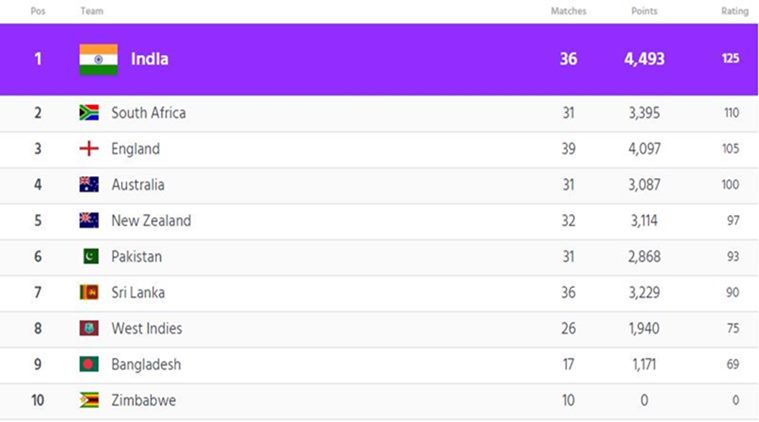Before proceeding, if you can read volume one of this three part series
Basis of the ranking system
I am certain that the ICC did not think through the ranking system when it was introduced. It was absolutely understandable because it was the very first time and it was almost impossible to think about every possible scenario before the system was implemented. Every system when it is introduced first will not be foolproof. It is naïve on our part to expect it to be perfect. It will have to undergo lot of tests in realtime to improve itself. Having said that, every series that was played after the ranking system came into existence would have offered ample amount of data. It should have been fed into the system so that the system is improved. The ICC certainly had lots of time to perfect a system that was introduced about 30 years ago. Unfortunately, the ICC have failed to achieve near perfection.
The current rating system
The rating system is based on assigning points to teams for every Test match played and then averaging it out over all Tests played by the team during the period under consideration. The final rating is thus an average score for the team during that period.
The points awarded to a team depends on the strength of the opposition. A win against a stronger opposition counts for more than a win against a weaker opposition. The strength of the opposition is determined by their rating points at the start of the series and updates happen only at the end of a series. Certainly not after each Test.
The problem with the ranking system
So far so good. Unfortunately, test win or series win outside of the home country is not given any weightage. The strength of the opposition certainly counts but wins in one’s comfort zone must carry more weight. Every team will know how difficult it is win outside their own country. For an Asian team like India, Sri Lanka, Bangladesh or Pakistan, it is extremely tough to win in South Africa or Australia or nowadays, in England. The same holds true to England or Australia or South Africa to win in India.
There are lot of examples of teams planning specifically to win in certain environs. Steve Waugh, for a very longtime, wanted to win in India because at that point, it was more than 30 years since any Australian team had won a test series in India. He even termed winning in India as the Last Frontier. It is that difficult to win in an opposition’s country. Graeme Smith, in his career was obsessed with winning in Australia.
Difficulty in winning outside home environs
Teams from out of the Asian zone are not accustomed to playing in spin friendly wickets and the Asian teams are not equipped to battle the fast bouncy wickets or the seaming conditions. Naturally, these wins must carry a lot of importance. India’s 2007 series win in England must certainly carry more points than India’s clean sweep of Sri Lanka in India. In much the same way, England’s 2-1 series win in India must carry even more points because until that series, India had lost only one series in over 15 years which goes to show how exceptional was England’s performance.
Similar was the case with Pakistan’s consecutive drawn series against England in England. On the otherhand, Pakistan’s series win in West Indies must not carry any extra points. South Africa have won not one not two but three consecutive series in Australia. This is something unprecedent. No team, absolutely no team would have managed to defeat Australia in three consecutive series in Australia. If these wins does not carry lot of importance, I don’t know what will. Unfortunately, ICC did not seem to think that these were exceptional performances. To give them the benefit of the doubt, probably they did not want to complicate the ranking system. If that is the case, they are wrong. The ICC must strive to give an accurate view of the ranking system.
Ideal ranking system
What is an ideal ranking system? This is certainly a difficult question to answer but answer we must. Atleast to ensure that only the best team is ranked number one.
The basic criteria are as follows
The first criteria must be that every team must have won atleast one series in every country they have played in their entire cricketing history. For almost all the teams, this gives them more than 75 years to have won atleast one series in every country.
The second criteria must be that every team must have won atleast one series in every country over the last 25 years.
The third and final criteria must be that every team must have won atleast 2 series outside their country over the last 10 years.
Apart from the above basic criteria, wins outside the home country and that too when a lower ranked nation defeats a higher ranked team, especially, in their own country that must carry additional points. For eg, if a bottom ranked team defeats a top ranked team in their home country, ofcourse it is a significant achievement and they must be awarded the one additional point because they have managed to defeat a higher ranked team.
At the sametime, if the bottom ranked team defeats a top ranked team in the top ranked team’s own backyard, not only should they be awarded the additional point for defeating a higher ranked team but they must also be awarded 2 more points for defeating them in their own country. As the difference in points between two teams narrows down or expands, so must the points. Ofcourse, there must a cap of say maximum of 5 points.
Yes I do realise that this is complicated but isn’t Cricket itself a complicated game?
to be continued………..



